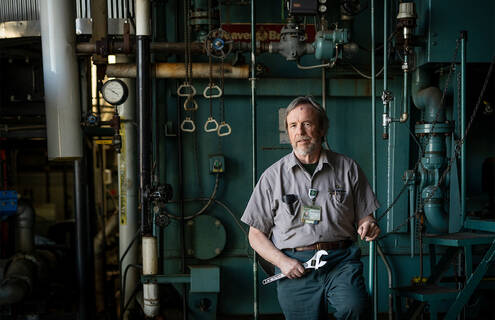
Humbling may be the first word that comes to mind when meeting the employees of Level 2.
On this floor beneath the hospital's main entry level are offices, labs, and rooms that patients usually do not see. Among them are: The Milk Lab, The Key/Lock Shop, Food and Nutrition Services, The Mail Center, Environmental and Waste Management Services, The Boiler Room, Engineering, and Central Sterile Reprocessing.
Employees here usually do not conduct surgeries or treat patient illnesses. But even at daybreak, their shared mission to provide unabating care to the community is visible at every turn.
"Level 2 is the heart and lifeblood of this hospital," says Director of Clinical Specialty Services, Scott Slogic.
“This is the heart down here, pumping away, where all things happen. It is the engine,” echoes Energy Plant Supervisor, Engineering, Bruce Spencer.
4:00 am: The Kitchen
The first employee switches on the lights.
“It’s like a living being awakening,” explains Director of Food and Nutrition Services, Fredrick Girard, who works together with Assistant Director, Elaine Churchill.
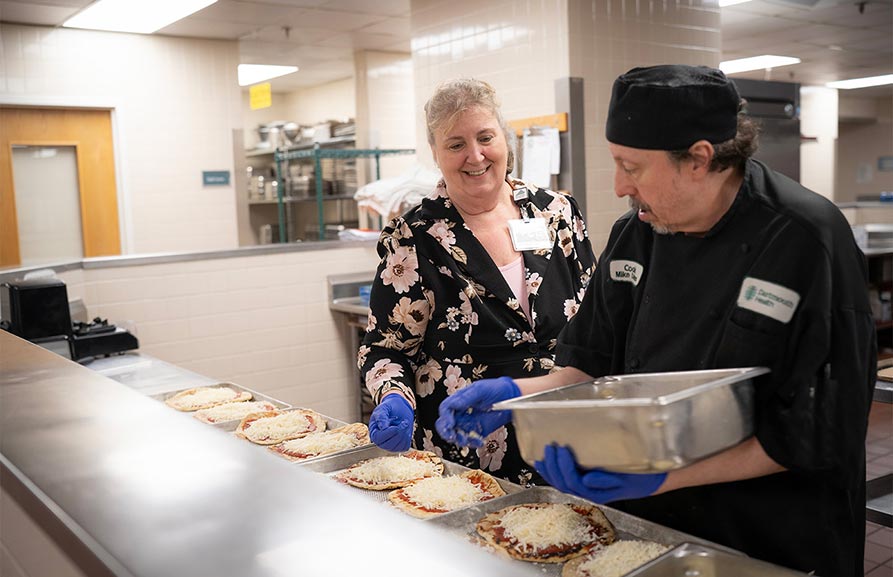
Churchill began working at the hospital 40 years ago, delivering to patients what were then simply trays of frozen food. Now, she is on a team of 40 full-time employees who plan and prepare 3,000 fresh, nutritional meals a day to patients in their rooms. Their team also provides fresh and often locally sourced food to the hospital’s dining room, cafes, and fresh-food vending machines.
Their compassion is palpable.
Executive Chef William Jones, who goes by David, tells new hires to put their heart into each meal because this meal could be the patient’s last.
“That is extremely poignant to think about,” says Girard.
6:30 am: The Milk Lab and The Boiler Room
Sealed is the door where breast milk will be sorted, stored, and distributed to newborn babies who need it. Other doors await, opening into offices marked by white lettering on green boards and filled with people who have been awake since dawn.
Beyond trains of blue bins is Spencer, who is making his early morning inspection.
With his six colleagues, Spencer tends to boilers that run 24x7, 365 days a year, except for six hours one summer night when the equipment is shut down for repair. During his inspection, he looks for puddles and listens to machinery sounds.
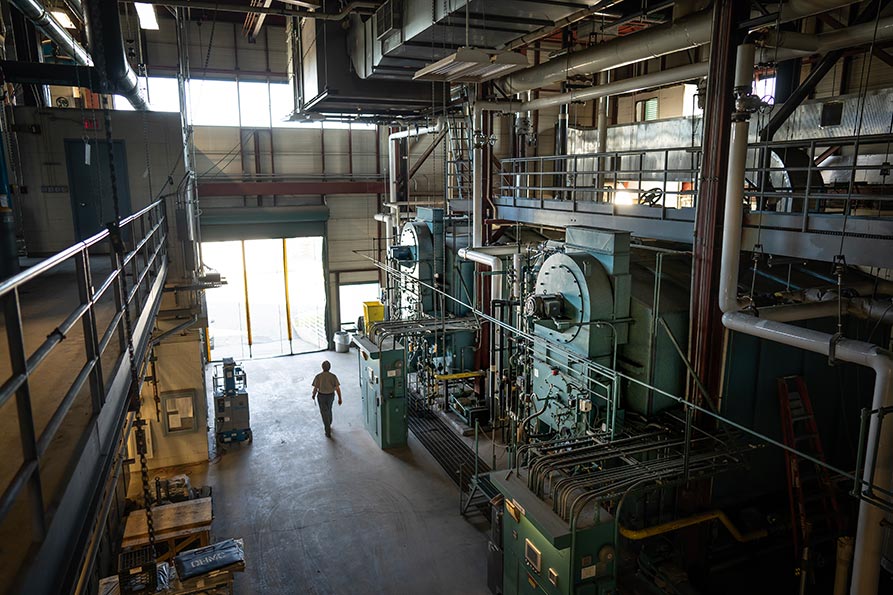
“We’re the best kept secret in this hospital that never stops,” explains this former merchant marine who started working for the hospital in 2002.
6:45 am: Patient Transport
Patient Transporter Stuart Lander has arrived and is striding past orange and black carts filled with isolation gowns, bath blankets, and folded spreads.
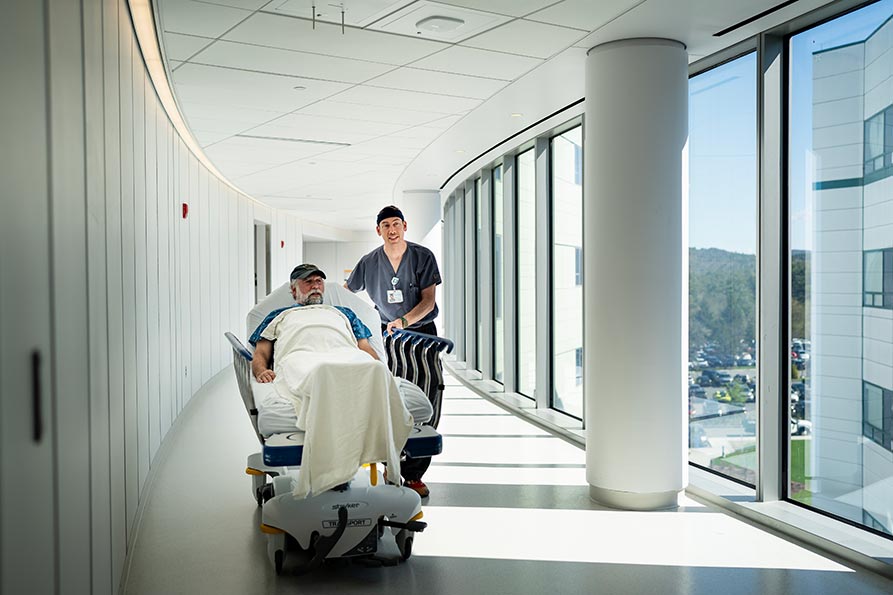
Weather permitting, Stuart rides to work each day on his mountain bike, which he teaches to children and adults after work and on the weekends. At the hospital, he transports patients and vital supplies. When he reaches his locker, he changes into scrubs, dons his orange sneakers, and grabs a Dartmouth Health phone that alerts him to upcoming assignments. He may retrieve a patient bed, stretcher, or wheelchair, or deliver blood to the Emergency Department.
When he works, Lander pays careful attention to what is happening around him. An employee of the hospital for 13 years, he is a lead trainer for new hires in Patient Transport.
“I always look out for the patients,” he says.
7:00 am: Environmental Services
The word of the day is ‘empathy’, a manager tells staff who are receiving morning assignments.
Among those listening is Tech Cert David Bouchier, who works in the Hematology/Oncology section at Dartmouth Cancer Center. His Environmental Services Supervisor, Leo Daly, shares numerous accolades from family members of patients whose rooms Bouchier has cleaned and who speak to Bouchier’s knowledge and pride in his work.
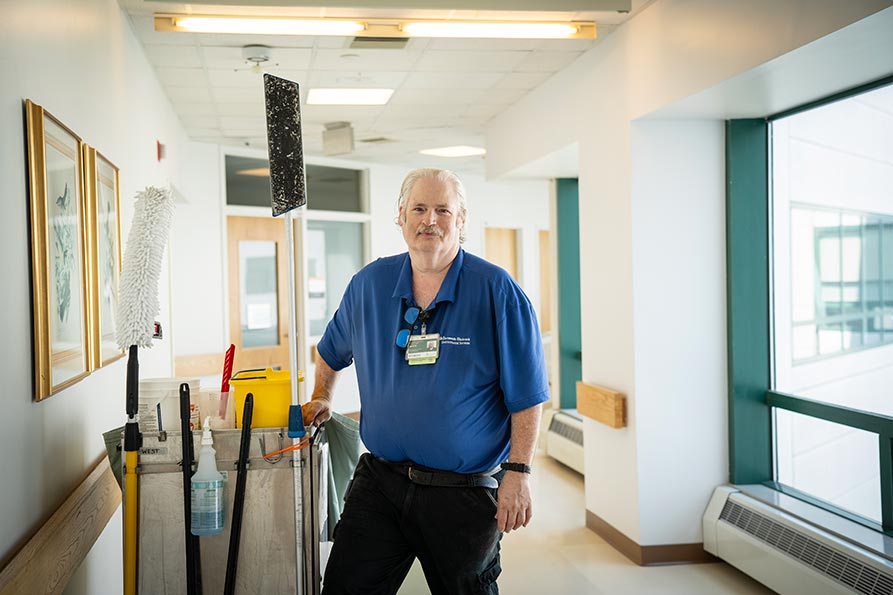
Bouchier downplays praise. His job, he explains, is to clean rooms and conduct additional ultraviolet disinfection to kill spores, pathogens, and any other invisible germs that could put patients at risk. He often talks to patients to put them at ease.
“I never tell them I know what you’re going through. Whatever you’re going through, these people are going through worse. You gotta go in with a good attitude,” he says.
7:15 am: The Key Shop
Cutting keys and fielding repair requests is Locksmith Tyler Charbono. Charbono manages the key system for the entire hospital and has been working since 6 am.
There are some 5,500 different keys in the hospital. Charbono is a perfectionist and focuses on every detail when he cuts a key. The security of people, supplies, and information is his priority, he says.
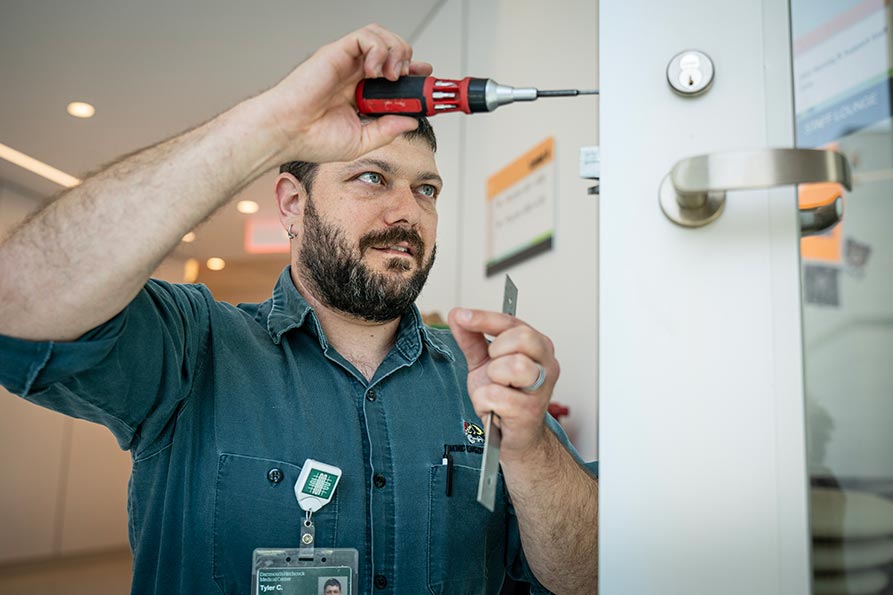
7:45 am: Central Sterile Reprocessing
Behind a hallway window, surgical instruments are being sterilized and O.R. kits are being assembled by men and women in protective gear. There works Supervisor Sarah Tarleton, who does not allow unauthorized entry into Central Sterile Reprocessing. This department cleans, inspects, verifies and sterilizes some 8,000 instruments a day for surgery.
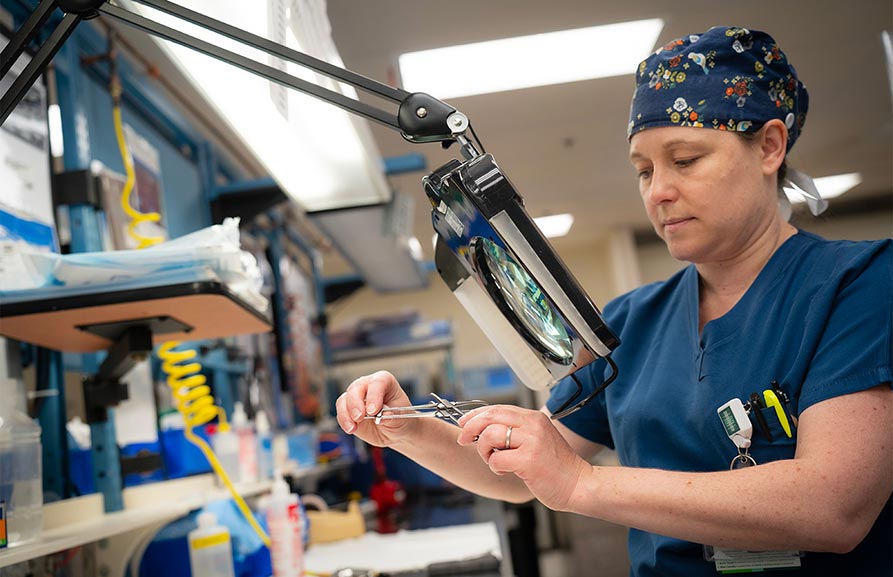
“We have to be ready for whatever comes. I like to say we have significant patient impact and no patient contact,” she says.
Employees here think on their feet. During COVID-19, they responded to the national shortage of N-95 masks by purchasing and preparing over 100,000 used respirators for reuse by front-line staff. Four teams worked three days on and three days off, in 12-hour shifts.
“We’re willing to do the hard work,” says Tarleton.
8:00 am: Waste and Recycling Services
Crew Leader Kyle Thresher stands ready at the door of Waste and Recycling Services. This department’s mission is to “enhance patient healing through Teamwork, Dedication, Infection, Prevention and the Pride we take in providing the best service, in the right place, at the right time, every time.”
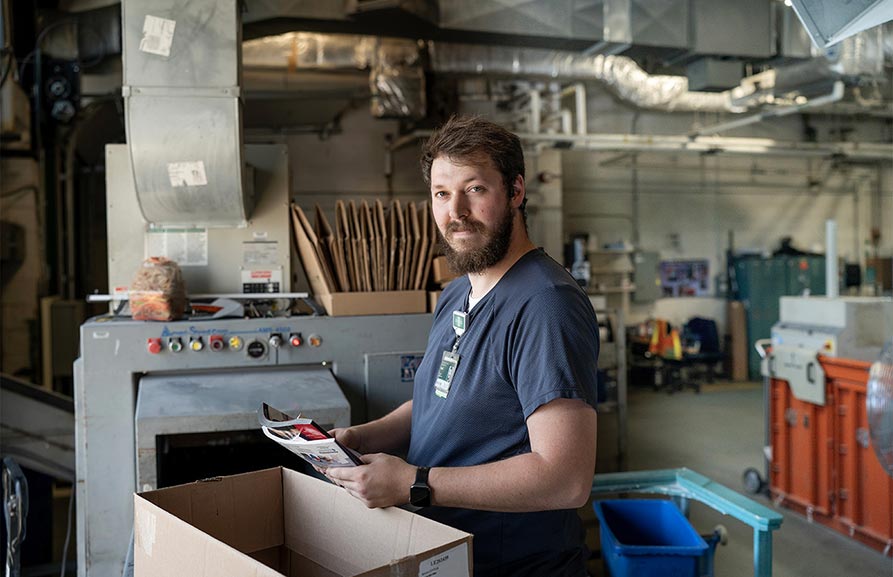
Thresher describes how hospital waste is processed, including putting bio bags into a two-hundred-degree steam processor that disinfects. An employee of more than six years, he shares how much he enjoys his work.
Director of Environmental/Waste Management Services John Rota, meantime, is busy at work in his office on the other end of the hall. He says that a change in cleaning materials a few years ago resulted in a 45% reduction in a once-common patient bacterial infection known as C. diff (Clostridioides difficile), which causes diarrhea and inflammation of the colon
8:15 am: Engineering
Employees prepare for another visit to the new Patient Pavilion. Behind them is a poster entitled ‘Taking Pride in Our Profession’ that showcases the names of current employees who together represent 905 years of service and whose employee tenures range from five to 38 years.
When asked about his work, Director of Engineering, Chris O’Hara, a father of four, says that he may not be in clinical work but he is driven by patient care, like his wife who is a nurse and his elder daughter who wants to go into medicine like her parents.
8:30 am: The Mail Center
A window opens into view.
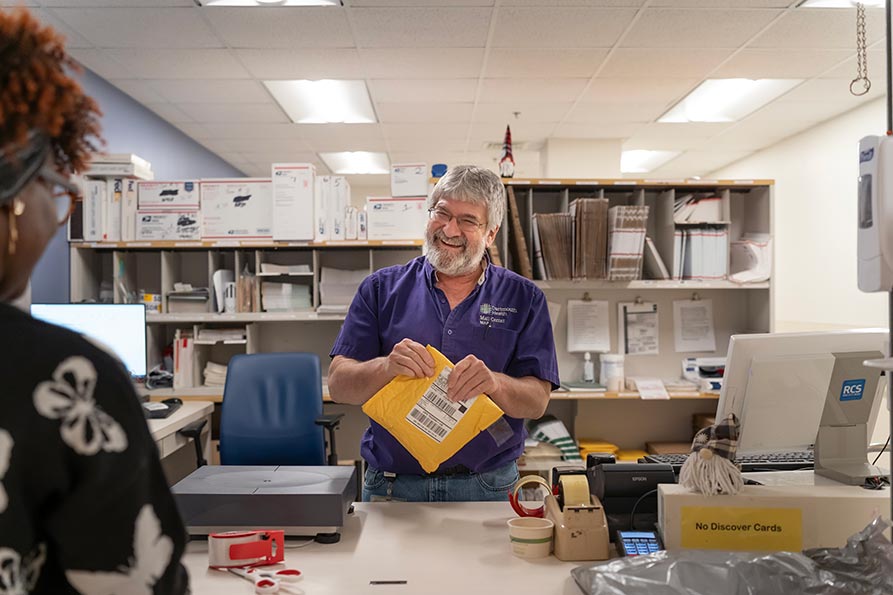
Mail Clerk Mark Richardson greets customers with a smile. For 24 years, Richardson has worked at this hospital, which warrants its own zip code: 03756. Richardson makes it a point to keep conversations light, share jokes, and be polite to everyone he helps because he knows the importance of the work being done.
9:00 am
This journey down the hospital lifeline has been brief, but the compassion, pride, and kindness of these employees endure.
Among the departments to be explored another day are: Clinical Engineering, Pharmacy, Inventory and Logistics, Vascular Access Services, Wound Care, Blood Bank, Informatics Systems and Connected Care.
"All of these employees contribute so much to make everything happen," points out Director of Clinical Specialty Services, Slogic.
When patient transporter Lander is later thanked for his time and told how humbling this experience has been, he responds quickly, expressing his appreciation and agreeing that learning how much these Level 2 employees care is humbling indeed.